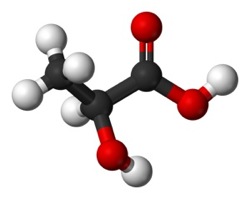
The Case of Reggie Harvey
last authored: Sept 2010, David LaPierre
last reviewed:
Reggie is a 43 year-old man who is brought to the emergency department poorly responsive. He was found by his girlfriend on the floor of his living room when she visited him in the evening.
His girfriend last saw him 12 hours ago, at which time he complained of abdominal pain. She is unaware of any health issues that Reggie has. She states he drinks perhaps 20 beers weekly.
The paramedics bring his medications in, which include:
- enalapril
- atorvastatin
- metformin
They also state they saw a number of empty liquor bottles in Reggie's apartment.
Part A - Initial Assessment
Reggie's vitals in the emergency department are HR 124, BP 112/74, RR 34, oxygen saturation 94% on room air, and temp 38.2.
His eyes remain closed, and he is mumbling random words. He pushes your hand away when you attempt sternal rub.
His physical exam is otherwise unremarkable, as far as is able to be assessed. In particular, his chest is clear, there are no murmurs, his abdomen is flat and soft, with no hepatosplenomegaly, and there is no edema.
What is his Glasgow Coma Scale?
His GCS is 8.
Eye Response4: spontaneous 3: opens eyes to commands 2: opens to pain 1: no eye opening
|
Verbal Response5: oriented 4: confused 3: inappropriate words 2: incomprehensible sounds 1: nil |
Motor Response6: obeys commands 5: localizes to pain 4: withdraws from pain 3: abnormal flexion to pain (decorticate) 2: abnormal extension to pain (decerebrate) 1: no response |
What is the differential diagnosis in this man?
The differential diagnosis of altered level of consciousness should include:
Drugs: alcohol, anticholinergics, benzodiazepines, diuretics, opioids, etc
Infection: meningitis, encephalitis, sepsis, pneumonia, UTI |
Metabolic:
Structural: stroke, tumour, abscess, seizures |
What is your initial management?
Always begin with ABCs. For Reggie, this should include:
|
One should also consider:
|
What investigations do you initiate?
Bloodwork:
|
Urinalysis Blood and urine cultures Arterial blood gas |
Imaging
|
Part B - return of the labwork
Reggie's glucose is found to be 2.5, prompting repeated boluses of D50. He soon becomes conscious, though remains confused and tachypneic.
Relevant investigations come back as follows:
WBC 13.5 hemoglobin 144 platelets 235
sodium 142 potassium 3.8 chloride 100 bicarbonate 18 |
glucose 3.2 urea 10.2 creatinine 144 ALT: 220 AST: 380 lactate 12 |
pH 7.28 pO2 100 pCO2 34
ethanol 0.12 g/L all other tox screen negative |
what is your differential diagnosis based on the above lab work?
His acidosis requires evaluation for anion gap. It is calculated by [sodium - chloride - bicarbonate] and is normally 10-14. For Reggie, his anion gap is 24.
The differential diagnosis for anion gap acidosis includes:
|
|
For Reggie, elevated lactate is an important finding.
What is the differential diagnosis of Reggie's elevated lactate?
decreased oxygen transport
increased metabolism
decreased oxygen use
|
decreased lactate metabolism
|
others
|
Reggie is admitted to the hospital to treat his acidosis, suspected to be due to his liver and kidney disease and precipitated by diabetes +/- metformin. Septic workup is negative. He is discharged four days later. He is counselled to decrease drinking and improve his sugar control.
for further reading:

